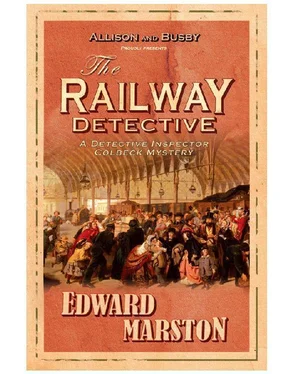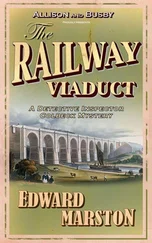Edward Marston - The Railway Detective
Здесь есть возможность читать онлайн «Edward Marston - The Railway Detective» весь текст электронной книги совершенно бесплатно (целиком полную версию без сокращений). В некоторых случаях можно слушать аудио, скачать через торрент в формате fb2 и присутствует краткое содержание. Жанр: Классический детектив, Исторический детектив, на английском языке. Описание произведения, (предисловие) а так же отзывы посетителей доступны на портале библиотеки ЛибКат.
- Название:The Railway Detective
- Автор:
- Жанр:
- Год:неизвестен
- ISBN:нет данных
- Рейтинг книги:4 / 5. Голосов: 1
-
Избранное:Добавить в избранное
- Отзывы:
-
Ваша оценка:
- 80
- 1
- 2
- 3
- 4
- 5
The Railway Detective: краткое содержание, описание и аннотация
Предлагаем к чтению аннотацию, описание, краткое содержание или предисловие (зависит от того, что написал сам автор книги «The Railway Detective»). Если вы не нашли необходимую информацию о книге — напишите в комментариях, мы постараемся отыскать её.
The Railway Detective — читать онлайн бесплатно полную книгу (весь текст) целиком
Ниже представлен текст книги, разбитый по страницам. Система сохранения места последней прочитанной страницы, позволяет с удобством читать онлайн бесплатно книгу «The Railway Detective», без необходимости каждый раз заново искать на чём Вы остановились. Поставьте закладку, и сможете в любой момент перейти на страницу, на которой закончили чтение.
Интервал:
Закладка:
Superintendent Tallis ruminated. Crossing to the desk, he picked up the paper and looked at the illustration of the Lord of the Isles . After a moment, he tossed it down again.
‘No,’ he decided. ‘Simply because there was an explosion in the Kilsby Tunnel, I do not foresee an outrage at the Crystal Palace.’
‘What if you are mistaken, sir?’
‘That is highly unlikely.’
‘But not impossible,’ reasoned Colbeck. ‘If there is some sort of attack on those locomotives, you will be blamed for not taking special precautions when you had been advised to do so. All that I am asking for is a small number of men.’
‘To do what?’
‘Mount a guard throughout the night. Nobody would be reckless enough to attempt anything in daylight — there would be far too many people about, helping to set up the exhibits.’
‘Are you volunteering to lead this guard detail?’
‘Provided that I have a free hand to choose my team.’
‘It could be a complete waste of time, Inspector.’
‘Then I will be the first to admit that I was wrong,’ said Colbeck, firmly. ‘If, on the other hand, we do foil an attempt to damage the locomotives, you will be given the credit for anticipating it.’
Tallis needed a few minutes to think it over. Inclined to dismiss the idea as fanciful, he feared the consequences if the Inspector were proved right. Robert Colbeck had a habit of coming up with strange proposals that somehow, against all the odds, bore fruit. A man who was ready to endure sleepless nights at the Crystal Palace had to be driven by a deep inner conviction. After meditation, Tallis elected to trust in it.
‘Very well, Inspector,’ he said. ‘Take the necessary steps.’
Thomas Sholto had known him for several years. Educated at the same school, they had been commissioned in the same regiment and served together in India. For all that, he could still be amazed at the dedication that Sir Humphrey Gilzean brought to any project. It was in evidence again when they met that morning to discuss their latest scheme. A large round mahogany table stood in the library at Gilzean’s house. Sholto was astounded to see what was lying on it. As well as a detailed floor plan of the Crystal Palace, there was a copy of the Official Catalogue for the Great Exhibition.
‘How on earth did you get hold of these?’ asked Sholto.
‘By a combination of money and persuasion,’ replied Gilzean, picking up the catalogue. ‘This is the first of five parts but the printers only have this one ready for the opening ceremony on May Day. Did you know that there are over 100,000 separate items on show, sent in from all over the world by individual and corporate exhibitors?’
‘Prince Albert wants it to be a truly unforgettable event.’
‘We will make sure that it is, Thomas.’ He put the catalogue down and scrutinised the plan. ‘Everything on show is divided into four different classes — Raw Materials, Machinery, Manufactures and Fine Arts.’
‘Any mention of the British Army? That’s what made the Empire.’
‘Only a display of Military Engineering and Ordnance.’
‘No bands, no parades, no demonstrations of military skills?’
‘No, Thomas. The emphasis is on industry in all its forms.’ He drew back his lips in a sneer. ‘Including the railways.’
‘Where are the locomotives housed, Humphrey?’
‘Here,’ said Gilzean, indicating a section of the ground floor plan. ‘What we are after is in an area devoted to Machinery for Direct Use.’
‘On the north side,’ observed Sholto. ‘It should not be difficult to gain access there. I took the trouble to have a preliminary look at the Crystal Palace when I accosted Lord Holcroft in Hyde Park. It is a vast cathedral of glass that looks like nothing so much as a giant conservatory. But, then, what else should one expect of a man like Joseph Paxton who is a landscape gardener?’
‘As far as I am concerned, Thomas, his notoriety lies elsewhere.’
‘Yes, Humphrey. He is a director of the Midland Railway.’
‘Had he not been,’ said Gilzean scornfully, ‘he might never have been employed to design that monstrous edifice. I am told, on good authority, that Joseph Paxton came down to the House of Commons last year for a meeting with Mr John Ellis, Member of Parliament and chairman of the Midland Railway, a ghastly individual with whom I’ve crossed swords more than once in the Chamber.’
‘Yes, Humphrey. I recall how you opposed his Railway Bill.’
‘It was a matter of honour. To return to Paxton,’ he said. ‘When our landscape gardener discovered how poor the acoustics were in the House of Commons, he decried the architect, Mr Barry. He then went on to say that those designing the hall for the Great Exhibition would also botch the job — even though he had not seen their plans.’
‘Mr Paxton is an arrogant man, by the sound of it.’
‘Arrogant?’ said Gilzean, scornfully. ‘The fellow has a conceit to rival Narcissus. At a meeting of the board of his railway company, he had the gall to sketch his idea for the building on a piece of blotting paper. That, Thomas, is how this Crystal Palace came into being.’
‘On a piece of blotting paper?’
‘The design was shown to Ellis, who passed it on to someone in authority and, the next thing you know, Paxton is invited to submit a plan and an estimate of its cost. To cap it all,’ said Gilzean through gritted teeth, ‘he is given an audience with Prince Albert himself. His Royal Highness was not the only one to approve of the design. Paxton managed to win the support of no less a personage than Robert Stephenson.’ He arched an imperious eyebrow. ‘The two of them met — appropriately enough — during a train journey to London.’
‘The railway has a lot to answer for, Humphrey.’
‘More than you know,’ returned the other. ‘In the early days, when we were doing our best to oppose the scheme, it looked as if the Great Exhibition might not even take place. It was dogged by all sorts of financial problems. Then in steps Mr Peto, the railway contractor, and offers to act as guarantor for the building by putting down £50,000. Once he had led the way,’ said Gilzean, ‘others quickly followed. Mr Peto also put his weight behind the choice of Paxton as the architect.’
‘At every stage,’ noted Sholto, ‘crucial decisions have been made by those connected with the railways. You can see how they stand to reap the benefit. When the Exhibition opens, excursion trains will run from all over the country. Railway companies will make immense profits.’
‘Not if I can help it, Thomas.’
‘The men are in readiness.’
‘They had better not repeat their failure at the Kilsby Tunnel.’
‘After what you said to them, Humphrey, they would not dare. They are still shaking. You put the fear of God into them.’
‘They deserved it.’
‘I agree,’ said Sholto. ‘Have you chosen the day yet?’
‘Thursday next.’
‘I’ll give them their orders.’
‘No, Thomas,’ said Gilzean, folding up the floor plan, ‘I’ll do that myself. I intend to be at my town house in London this week. I want to hear those locomotives being blown apart.’
‘They’ll take a large part of the Crystal Palace with them. That glass is very fragile. It will shatter into millions of shards.’ Sholto laughed harshly. ‘A pity that it will happen in darkness — it should be a wondrous sight. Farewell to the Great Exhibition!’
‘Farewell to the Lord of the Isles and all those other locomotives,’ said Gilzean, bitterly. I’ll never forgive the railways for what they did to me. My ambition is to act as a scourge to the whole damnable industry.’
Читать дальшеИнтервал:
Закладка:
Похожие книги на «The Railway Detective»
Представляем Вашему вниманию похожие книги на «The Railway Detective» списком для выбора. Мы отобрали схожую по названию и смыслу литературу в надежде предоставить читателям больше вариантов отыскать новые, интересные, ещё непрочитанные произведения.
Обсуждение, отзывы о книге «The Railway Detective» и просто собственные мнения читателей. Оставьте ваши комментарии, напишите, что Вы думаете о произведении, его смысле или главных героях. Укажите что конкретно понравилось, а что нет, и почему Вы так считаете.












